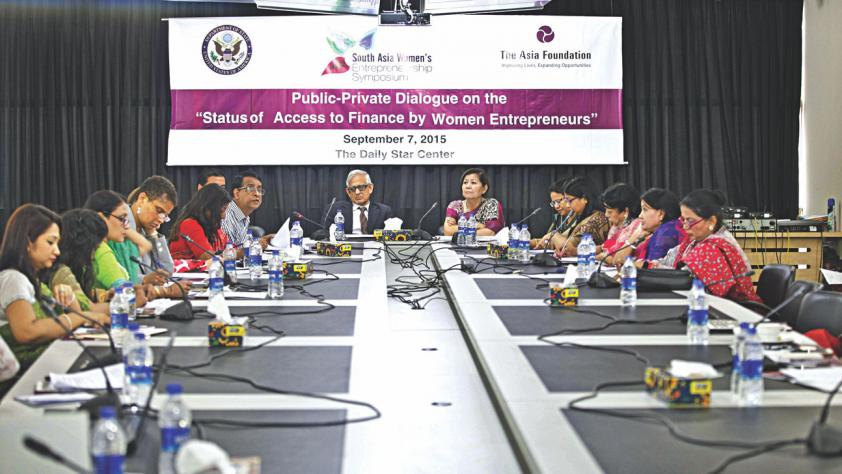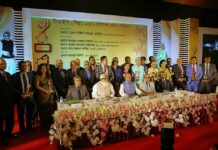Access to finance remains a challenge for women entrepreneurs, despite progress and a change in the mindset of lenders and policymakers.
Speakers at a symposium yesterday stressed the need for women entrepreneurs to diversify their businesses and products.
The Asia Foundation, in collaboration with the US Department of State, organised the symposium on women entrepreneurship, at The Daily Star Centre in Dhaka.
Access to finance is a much-talked about issue all over the world now, said Rokia Afzal Rahman, president of Bangladesh Federation of Women Entrepreneurs.
“It’s a universal problem for women entrepreneurs,” she said at a panel discussion on ‘government oversight of financial access commitments for women entrepreneurs’ at the daylong event.
She said women entrepreneurs previously did not get access to finance, only because they had no track-record in business. “But now they are being given access to finance as they have proved that they are good borrowers.”
Where the loan recovery rate from for men is 70 percent to 80 percent, it is 99 percent for women borrowers, she said.
“The credit system may be simplified, but access to finance is much better today than earlier because of a change in the mindset of bankers,” said Rahman, also a former caretaker government adviser.
Today, women entrepreneurs lag in getting into diversified products and bigger businesses, she said. “Women mostly get involved in boutiques and handicrafts, but they need to diversify their products and the commerce ministry can help them diversify their products.”
Selima Ahmad, president of Bangladesh Women Chamber of Commerce and Industry, said the situation is much better now but women entrepreneurs at grassroots level still face hurdles in getting bank loans.
Amitava Chakraborty, additional secretary of the commerce ministry and director general of WTO Cell, said the sixth five-year plan consists of a special focus on expanding women employment opportunities, meaningful women engagement in the economic agenda, and promoting women entrepreneurship and their access to credit.
Many government agencies and nongovernmental organisations, such as SME Foundation, Bangladesh Small and Cottage Industries Corporation, Grameen Bank and Brac, are working on developing women entrepreneurship, he said.
“From our ministry, the Export Promotion Bureau is arranging a regional trade fair in India, Nepal and some other countries so that women entrepreneurs can participate at half the cost.”
From its export development fund, EPB also gives loans to women entrepreneurs at a rate of 5 percent on up to Tk 5 lakh for product development, he said, requesting women entrepreneurs to make use of the facilities.
Earlier at the opening session, David Meale, chargé d’affaires at the US Embassy in Dhaka, said entrepreneurship in small business development is fundamental for a sustained and balanced economic growth.
Citing the contribution of small businesses to the US economy, he said 28 million small enterprises account for 54 percent of all sales. “Small businesses provide 55 percent of all jobs and 56 percent of new jobs in the US.”
Since 1990, larger companies have eliminated four million jobs, but small enterprises have added eight million jobs, he said, referring to recent statistics.
“No wonder my country and my government are so excited to focus on business creation as we engage in economic diplomacy in Bangladesh,” Meale said.
“Our bilateral interaction is particularly compelling at the time. This is a result of a number of factors, including strong bilateral relations, impressive trade figures and extensive interest of the US companies in Bangladesh,” he said.
A more than 6 percent economic growth projection by the government, World Bank, International Monetary Fund and Asian Development Bank suggests that there are numerous opportunities for women to continue to rise with Bangladesh’s tide, he added.
Hafiz Mazumder, chairman of Pubali Bank, said a country can never achieve its desired goal of development unless half of the population is brought to economic activities.
“I urge all parents to encourage their daughters to come to business. Unless they get encouragement from their own families, it would be difficult to engage women in economic activity,” he said, adding that women should also come forward to take part in economic development by being an entrepreneur.
Hasan Mazumdar, country representative of the Asia Foundation, said women own less than 10 percent of small and medium enterprises in South Asia, and in Bangladesh, it is only 2 percent.
Referring to UN reports, he said 80 percent of women in this region are adversely considered as vulnerable for employment. “Women have a potential to contribute more to the country’s economy. But they are still facing many barriers, including limited access to regional markets, finance, skills training, networks and information as well as legal and policy constraints.”
Source: The Daily Star










